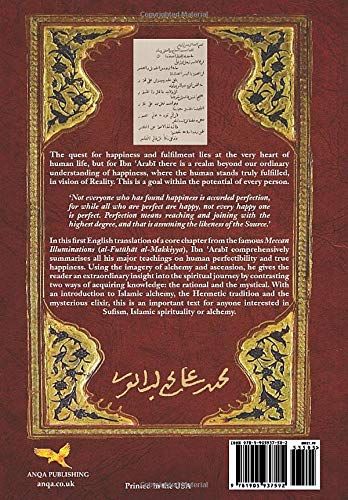About The Book
The quest for happiness and fulfillment lies at the very heart of all human life, and in the teaching of one of the world's greatest mystical writers, Ibn 'Arabi, true happiness consists in the vision of One Reality underlying all manifestation. This is a goal within the potential of every person. In this first English translation of a core chapter from the famous Meccan Illuminations (al-Futuhat al-Makkiyya), Ibn 'Arabi comprehensively summarizes all his major teachings on human perfectibility and true happiness.
Using the imagery of alchemy and ascension, he gives the reader a unique insight into the spiritual journey by contrasting two ways of acquiring knowledge: the rational and the mystical. With an introduction to Islamic alchemy, the Hermetic tradition and the mysterious elixir, this book is an essential text for anyone interested in Sufism, Islamic spirituality or medieval alchemy.
Using the imagery of alchemy and ascension, he gives the reader a unique insight into the spiritual journey by contrasting two ways of acquiring knowledge: the rational and the mystical. With an introduction to Islamic alchemy, the Hermetic tradition and the mysterious elixir, this book is an essential text for anyone interested in Sufism, Islamic spirituality or medieval alchemy.
About The Author
Dr Suha Taji-Farouki is a specialist in modern Islamic thought. She obtained her PhD in Islamic Studies and Middle Eastern Politics from the University of Exeter in 1993. She is Lecturer in Modern Islam at the Institute of Arab and Islamic Studies, University of Exeter, and a Research Associate at the Institute of Ismaili Studies, London.
She has been a Lecturer in Modern Islam at the Centre for Middle Eastern and Islamic Studies at the University of Durham. She has also served as the Secretary of the European Association for Middle Eastern Studies. Dr Taji-Farouki is working on aspects of the legacy of Ibn Arabi in the 20th century.
Dr Suha Taji-Farouki is a specialist in modern Islamic thought. She obtained her PhD in Islamic Studies and Middle Eastern Politics from the University of Exeter in 1993. She is Lecturer in Modern Islam at the Institute of Arab and Islamic Studies, University of Exeter, and a Research Associate at the Institute of Ismaili Studies, London.
She has been a Lecturer in Modern Islam at the Centre for Middle Eastern and Islamic Studies at the University of Durham. She has also served as the Secretary of the European Association for Middle Eastern Studies. Dr Taji-Farouki is working on aspects of the legacy of Ibn Arabi in the 20th century.
About The Translator
Stephen Hirtenstein is a Senior Research Fellow of the Muhyiddin Ibn 'Arabi Society and Editor of the Society Journal, as well as director of Anqa Publishing. He also works as a senior editor on Encyclopaedia Islamica, and teaches Sufism and Sufi poetry at the University of Oxford. His particular interest is in the conservation of the existing manuscripts of Ibn 'Arabi's works.
His publications include The Unlimited Mercifier (a biography of Ibn 'Arabi) and translations of shorter treatises (Divine Sayings, Seven Days of the Heart). Muhyiddin Ibn 'Arabi (1165–1240) is unquestionably one of the most profound and remarkable figures in the history of world spirituality, and became known within the Islamic world simply as 'the Greatest Master' (al-Shaykh al-Akbar).
He provided the most comprehensive understanding of Islam from its most literal to its most profound meaning, and his influence upon later generations of spiritual masters can be seen in countries as far apart as Spain and Indonesia. Ibn 'Arabi's writings are founded on a totally harmonious vision of Reality as One and Many, integrating all apparent differences without destroying their truths. They are singularly appropriate and needed in the world of today.
His publications include The Unlimited Mercifier (a biography of Ibn 'Arabi) and translations of shorter treatises (Divine Sayings, Seven Days of the Heart). Muhyiddin Ibn 'Arabi (1165–1240) is unquestionably one of the most profound and remarkable figures in the history of world spirituality, and became known within the Islamic world simply as 'the Greatest Master' (al-Shaykh al-Akbar).
He provided the most comprehensive understanding of Islam from its most literal to its most profound meaning, and his influence upon later generations of spiritual masters can be seen in countries as far apart as Spain and Indonesia. Ibn 'Arabi's writings are founded on a totally harmonious vision of Reality as One and Many, integrating all apparent differences without destroying their truths. They are singularly appropriate and needed in the world of today.




